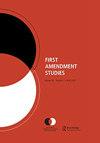Varieties of censorship: Hate speech, pornography, and the First Amendment
Q2 Social Sciences
引用次数: 0
Abstract
ABSTRACT Until the 1960s, governmental limits on speech and expression, particularly around issues of pornography and obscenity, were common. These restrictions were enacted to reinforce a set of standards that had broad support among the American people. Since the 1960s, we have seen a great expansion of the right to free speech and expression. Today, however, the libertarian consensus has fractured. The new censorship that favors regulating hate speech confronts the underlying premises of the old censorship. Rather than comparing and contrasting the libertarian position with the censorship of hate speech position, as is so often done, in this article, I will compare and contrast two pro-censorship positions, one group favoring the censorship of hate speech, the other favoring the censorship of pornography and obscenity. My purpose is not to advocate for censorship. Rather, my idea is to examine and explain the different rationales that exist in the two opposing approaches to censorship, to better judge the merits of censorship and free speech.各种审查制度:仇恨言论、色情和第一修正案
摘要直到20世纪60年代,政府对言论和表达的限制,特别是在色情和淫秽问题上,一直很普遍。制定这些限制是为了加强一套在美国人民中得到广泛支持的标准。自20世纪60年代以来,我们看到言论和表达自由权的大幅扩大。然而,今天,自由意志主义的共识已经破裂。有利于规范仇恨言论的新审查制度与旧审查制度的基本前提背道而驰。在这篇文章中,我将比较和对比两种支持审查的立场,一种支持仇恨言论审查,另一种支持色情和淫秽内容审查。我的目的不是提倡审查制度。相反,我的想法是审查和解释两种相反的审查方法中存在的不同理由,以更好地判断审查和言论自由的优点。
本文章由计算机程序翻译,如有差异,请以英文原文为准。
求助全文
约1分钟内获得全文
求助全文
来源期刊

First Amendment Studies
Social Sciences-Law
自引率
0.00%
发文量
0
期刊介绍:
First Amendment Studies publishes original scholarship on all aspects of free speech and embraces the full range of critical, historical, empirical, and descriptive methodologies. First Amendment Studies welcomes scholarship addressing areas including but not limited to: • doctrinal analysis of international and national free speech law and legislation • rhetorical analysis of cases and judicial rhetoric • theoretical and cultural issues related to free speech • the role of free speech in a wide variety of contexts (e.g., organizations, popular culture, traditional and new media).
 求助内容:
求助内容: 应助结果提醒方式:
应助结果提醒方式:


